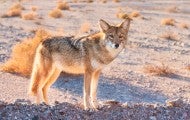WASHINGTON - The Humane Society of the United States released today the results of a disturbing undercover investigation into two wildlife killing contests in Frederick County and in Waldorf, Maryland. Investigators documented the judging portions of the events, with participants lining up rows of...
For wildlife on a beautiful 32-acre property in Mount Airy, Maryland, life is sweeter—and safer—because of the pledge landowners Jennifer Bevan-Dangel and Andrew Dangel made to follow the Humane Stewardship Alliance’s humane stewardship principles in managing their land. Lands of all sizes can be...
Today, the New York state legislature passed a bill that ends inhumane wildlife killing contests, in which participants compete to kill the most, the heaviest and the smallest animals for cash and prizes. In 2018 and 2020, the Humane Society of the United States released undercover investigations...
It began, almost certainly, in a bat. Then, just as SARS jumped to civets from bats, the virus that causes COVID-19 passed to another mammal, possibly a pangolin. Finally, late last year, the new coronavirus most likely jumped to humans in a wildlife market in Wuhan, China, a densely populated city...
In March, as people struggled to understand how the precursor of the virus that causes COVID-19 emerged from horseshoe bats in southern China and reached humans in the central city of Wuhan, Humane Society International policy specialist Peter Li fielded one question again and again: “Why do Chinese...


